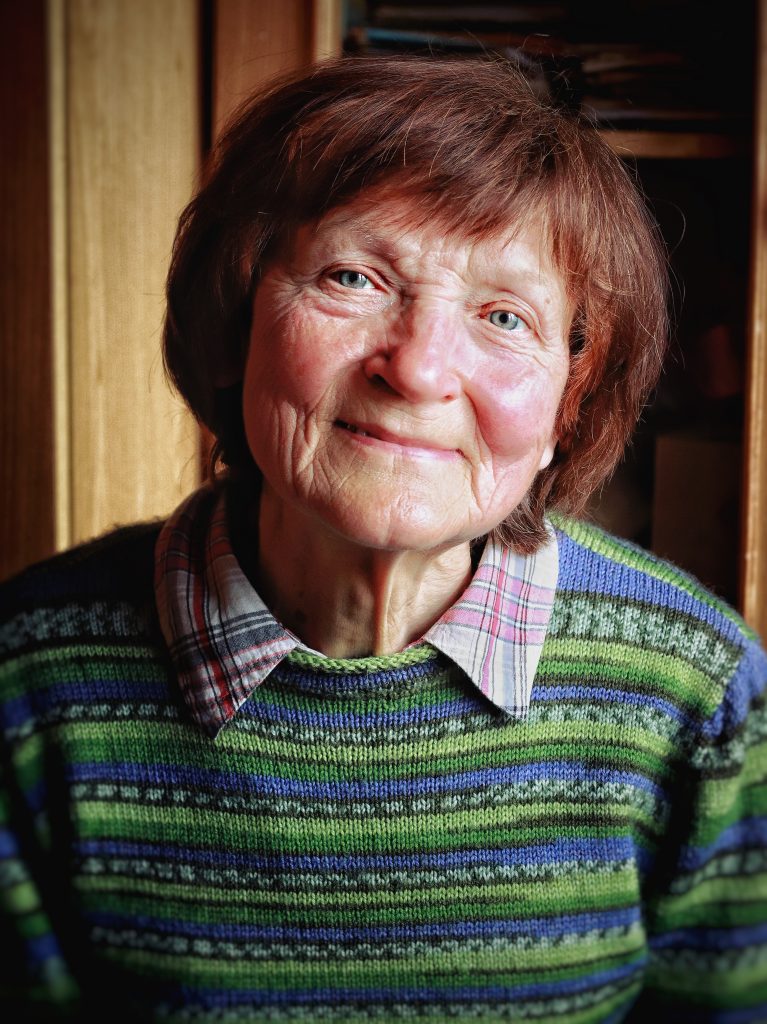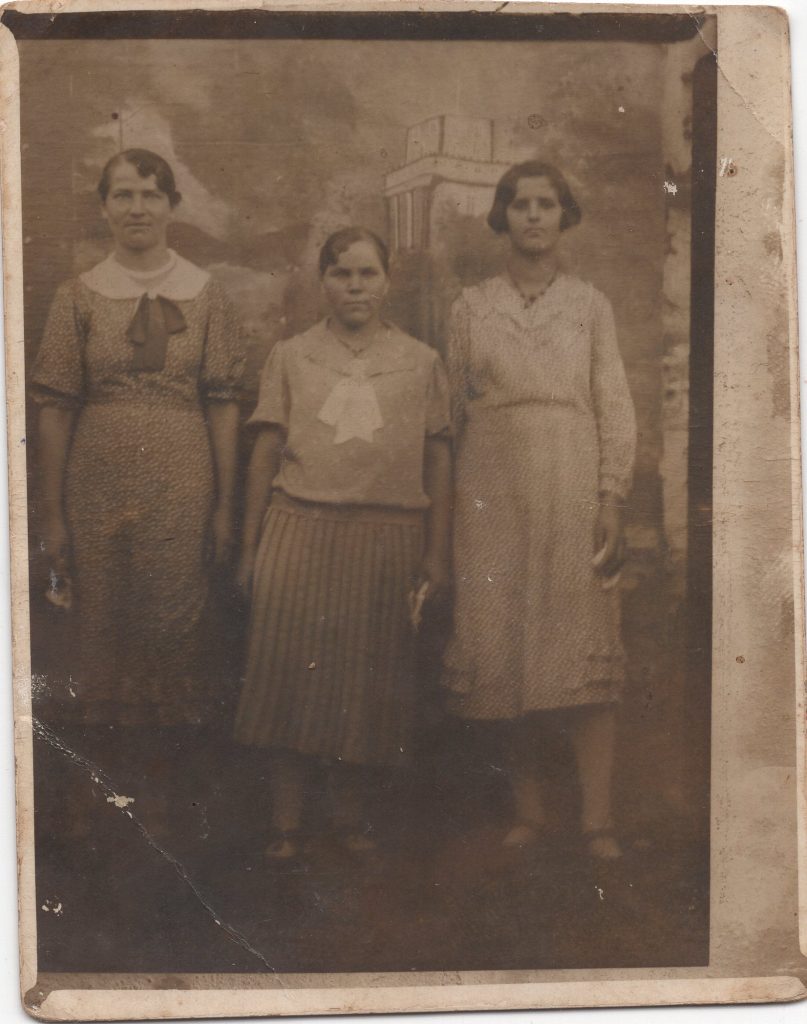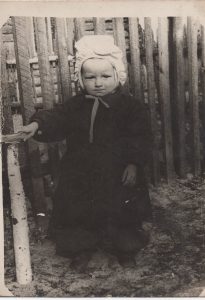Mariya Shovhenyuk

Mariya Shovheniuk (from the house of Nahirni) was born on June 30, 1949, in the village of Pochapy, Zolochiv district, Lviv region.
FROM POLAND TO UKRAINE (1945-1949)
Mariya’s parents came from the village Negoslav (Vovchaste hamlet), Dresdenko gmina, Strzelec-Dresden County, Lubusz Voivodeship, Poland.
In the autumn of 1944, Poland and the Ukrainian SSR signed an agreement: “Agreement between the Government of the Ukrainian SSR and the Polish National Liberation Committee on the evacuation of the Ukrainian population from Poland and Polish citizens from the USSR.” It provided for the resettlement of Ukrainians from 4 counties of Galicia and 7 counties of Kholm to the USSR and resettlement to Poland of Poles and Jews who, as of September 17, 1939, were citizens of the Polish state. Initially, voluntary exchange of population was envisaged. Representatives of the communist government addressed the people: “Get together and leave while we still are just asking you”. But Ukrainians did not want to leave their homes: “And people laughed at them: “How can we leave our lands, and go there, to the Great Country?”. And no one agreed”. Over time, the communist regime began to put pressure on people: “Now we ask you, but later you will beg us”. Soon the situation worsened: “And here they started… It is clear that they gave weapons to the Poles, so you know, to the Poles who were not very decent, and they started going from house to house, killing people, many of them… families that consisted of several people were killed… Well, my parents, somehow, thank God, survived, but other people… [They even killed] little children, in cradles! There is even our relative, so his wife was killed, and even his child in the cradle…” After that, the resettlement began: “And so then the people themselves have already volunteered to leave because there was no other way out … And they took them away, and they…”
Young fellow villagers Roman and Kateryna had known each other before, but the common trouble united them. While waiting for the train at the train station, they became closer, began to communicate closely, got married. The family had no children for a long time. Only in 1949, the long-awaited child was born. The daughter was named Mariya.
The Nahirni family was relocated to the village of Pochapy, Zolochiv district, Lviv region. They had their own house there, a household.
“AND THEY CAME, “PACK YOUR BELONGINGS! GET READY!” THE ROAD TO SIBERIA.
In the late 1940s and early 1950s, the Soviet punitive authorities switched to a different tactic against the Ukrainian underground movement. For every anti-Soviet act in one area or another, they took revenge on the local population. This explains the deportation of the Nahirni family, as none of them took part in the insurgent’s movement, they did not even have relatives there, as they were deported from Poland in 1945. Mariya Shovheniuk herself still does not know why her family was repressed: “The village was, you know, in the Lviv region, and there were many people in the UPA … And they decided, so…. My mother says: “Cars are roaring, roaring, and but they were not expected here. But those insurgents didn’t have time yet…” When NKVD fighters entered Nahirni’s house, her father was not at home, he went to a neighbor to slaughter a pig. So her mother had to hurry up and pack everything: “And my mother ran quickly to my father, and then they packed everything they could, some packages… And then they left. And they left most of their belongings behind.” After that, the family spent four months in a transit prison on Poltviana Street in Lviv. Mariya knows about the transit prison from her mother: “She said the children were dying of scarlet fever and other infectious diseases. And near me, she said, two children died, and I remain to this day, yes…” In the autumn of 1950, along with other deportees, the Nahirni family left for Siberia.
The deportees were transported to Tomsk by rail: “And then we… By train, in the freight train, in terrible conditions, people say the conditions were terrible. People couldn’t stand it, they went crazy, it was terrible, yes, it was scary…” Then people were placed on a barge: “They used barges, you know, because it was possible to travel there by water in the summer, and in the winter only on a sleigh on the river. There was no other transport connection. Well, so they brought us, and my mother says, people were losing their minds… Some died on the road, she says, then they were thrown into the water. It was terrible, the way people were treated was terrible”

“AND SO WE WERE EVICTED TO THAT AREA… WE WERE THROWN OUT THERE.” A SPECIAL SETTLEMENT WITH A COSSACK NAME.
The Nahirni family was deported to the special settlement Baturyno, Asinovskyi district of the Tomsk region, RSFSR. Apart from Ukrainians, there were Moldovans and Lithuanians in the village.
My father, like most deported men from Ukraine, started working at a lumber camp. The mother stayed at home at first with her daughter, and later got a job as a stove-setter at a local school and office. Roman Nahirnyi, together with the deported Latvian, built a house for two families: “There was one room, and the other family had their own room, and there was a small kitchen, and later they added some other premises, you know, right there. I don’t know how we managed to live there. But we somehow lived there – there was no other way out…” The first years were the most difficult: “At first it was very difficult, my mother said, we didn’t even have food to make a simple soup: no potatoes, no porridge – we were extremely poor.” Unusual climate, hard work, and a half-starving life affected them – her father got sciatica due to hypothermia, and her mother fell ill with moon blindness. Fleas were annoying the family in the house.
Later life became easier. They had their own household: “There was a stable, a stable! We had a pig, and the garden, then we cleared the garden and planted potatoes. But cucumbers and tomatoes were green – they couldn’t ripen… We also had a female goat, yes! And my mom had a couple of little goatlets… That’s how we lived…” Living by the forest was beneficial for us: “In the fall, mom and dad would go, and find a timber, you know, a log. It had to be in the shape of a hammer, so there would be a stick in the middle, a thick stick. And they used it to hammer the cedar trees, and then “rat-tat-tat” – [pignoli] started falling down! They gathered a bag full of the tree nuts and we had something to eat all winter!”
With the arrival of new consignments of deportees, the special settlement grew. Over time, there were three streets instead of one. There were Shevchenka, Tsentralna, and Mayakovskoho streets. The Nahirni family lived on Shevchenka Street. In 1954, son Yaroslav was born into the family of Kateryna and Roman.
Mariya Nahirna was deported at the age of ten months, so she did not remember Ukraine: “It was good for me there because I didn’t know anything else…” Therefore, she led a normal life for her age. She played with girlfriends: “We lived on Shevchenka Street. And I ran there to the Tsentralna Street because my friends lived there. And so we… And there, you know, we were surviving.” She helped her mother to pick berries and mushrooms: “There were aphyny – it’s blueberries in Ukrainian, aphyny is a local word, also cranberries, some stones brambles, heath berries, mushrooms… And our house was like this house! And right behind the house, there was a forest with young pine trees, and there were many… What are they called… Buttercups mushrooms. So usually I would go, my mother would give me a bag, and I would go pick mushrooms. And then we ate them. Also, my mother went to pick blueberries a little further in the forest…” The children’s games at the special settlement also changed with age: “We went to the forest, climbed the spruces! Chipmunks… And the boys, batiary – they once caught a chipmunk! And, so they… They took the skin off it. They were hooligans, batiars… And then there was Mykola, he was a real hooligan! He was so big! And you know, he took a frog and burned a frog on fire! Well, that’s how it was – many things happened! We also made forest shelters for ourselves! Well, what were we supposed to do there?! And that’s how we lived, and played…” The girls had other entertainment: “Ah! Girls, we had paper dolls: you take a page from a notebook, cut out a doll, and you cut out hands, feet, and then you dress it in colorful dresses like that, and we also colored them… Later, when I was a bit older, I had a tambour frame, you know? And I was embroidering… My mother embroidered, you know, and I learned from her.”
When Mariya reached school age, she went to study. There was only a primary school in the special settlement. Mariya has good memories of her school years: “We had a teacher, Bakuma Liubov Ivanovna, she was a good teacher.” Among school subjects, she mentions: “Russian language, arithmetic, and what’s the name for it – reading, mathematics, and writing, and that’s all.” Lessons were conducted in Russian, but during breaks, the communication was not regulated: “And we, you know, there were a lot of Ukrainians, and during the break, we communicated with each other, and we spoke Ukrainian.” The parents also tried to make their daughter know her native language: “My aunt from Tysmenytsia sent me Ukrainian books… Books in Ukrainian: Anderson’s book – fairy tales, and then some other… And those were already Soviet books… But this book was written by Anderson, I was… I was learning how to read Ukrainian using this book.”
Ukrainians at the special settlement tried to preserve their culture and traditions, but they were doing it secretly, hiding from the authorities: “So I remember carols the most, you know. We went from house to house, I was with my friend, Yuliya Sobylyak, she is also somewhere in the Lviv region, I don’t know where. The two of us went from house to house together, but we couldn’t sing carols – then we went inside the house, to our Ukrainian families, and we sang carols to them there, and they gave us money, yes. And we also sang Shchedrivky. It was my mother who taught me to sing shchedrivky…” However, there was no church in the special settlement, as well as no clergy. So Mariya and her brother were baptized after returning to Ukraine.
The reasons for the deportation were not discussed in the Nahirni family: “Under no circumstances! We didn’t discuss why we were evicted… That’s how everything was at that time – they did what they wanted to do.” Similarly, out of fear, they did not touch on political issues, in particular, they were afraid to speak about Stalin’s death in the presence of a small child: “Oh, oh, oh. They… You know, the child might blurt out something accidentally. No, there were no conversations on these topics. Well, maybe they did talk about it among themselves – yes. But you know – if you think about what they went through… So… My mother is a bit brave, but my father… Even until the very end he never opened up…”

photo: Yaroslav Nagirny – Maria’s brother, born in 1954 in a special settlement.
RETURNING HOME
In 1960, the Nahirni family received permission to return. They sold everything they acquired – the house, the household. Dad also saved money. This allowed them to travel home. Upon their return, they didn’t receive their property back, confiscated in 1950: “Nothing! Absolutely nothing”. So they first settled with their mother’s brother in Kolomyia and then built a house nearby.
Due to the status of deportees, members of the Nahirni family were discriminated: “Very… It was happening all the time… They had so many questions for my dad! They were picking at him so much! It’s difficult to describe! They always called him in, constantly…” At first, the school did not want to take Mariya. Later, after two attempts, she was unable to enter the Chernivtsi Medical Institute. Therefore, she was able to obtain a secondary special education at the School of Pharmacy. But Maria Shovheniuk does not complain about fate: “And I do not regret it! That’s how it had to be. And I graduated from a pharmacy, you know, and now I’m a doctor myself… And I know what to suggest to a sick person, I know all the herbs. And that’s how I treat myself… And I live to this day…”
Now Mariya Shovheniuk lives in Kolomyia, Lviv region.
